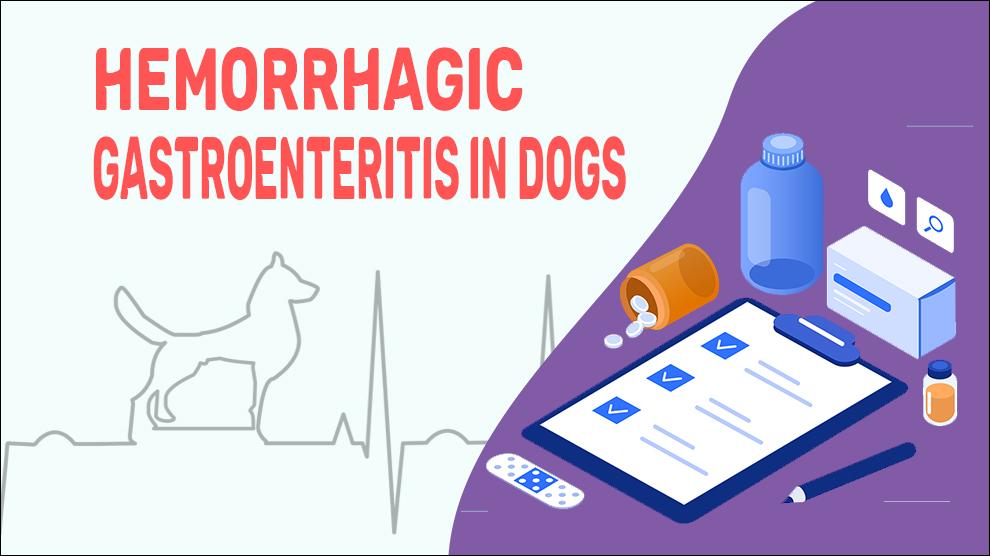Hemorrhagic Gastroenteritis (HGE) is a multifactorial disease characterized by chronic inflammation of a dog's intestinal tract distinguished by sudden onset of profuse bloody diarrhea and vomiting.
Hemorrhagic gastroenteritis - medically known as Acute Hemorrhagic Diarrhea Syndrome (AHDS) - typically affects small breed dogs and young to middle-aged dogs. The clinical course involves a per-acute onset of clinical signs that may lead quickly to death without prompt therapy.
Although AHDS has similar symptoms to other causes of bloody diarrhea, such as pancreatitis and parvovirus, it is a unique condition that occurs with explosive diarrhea together with a prominent packed cell volume (PCV) of at least 60%. Although the etiology is unknown, it has been thought that uncharacteristic immune responses to bacteria such as (Clostridium perfringens), Pancreatitis, Bowel cancer in older dogs, and Inflammatory bowel disease.
While it is certainly daunting to see your dog having bloody diarrhea and vomiting, immediate medical intervention can be of paramount importance and have a good prognosis.
Symptoms Of Hemorrhagic Gastroenteritis
- Chronic diarrhea
- Chronic vomiting
- Weight Loss
- Hyporexia to anorexia
- Abdominal discomfort
- Bacterial infection in the blood (bacteremia).
Treatment Options For Hemorrhagic Gastroenteritis
The Treatment depends upon the underlying cause and extent/severity of the problem.
Medications for medical conditions should be provided only as required.
Antibiotics: Azithromycin or erythromycin.
Anti-inflammatory and Immunosuppressive Therapy: Prednisolone or Prednisone, Cyclosporine, Chlorambucil, Budesonide, or Sulfasalazine.
Dietary Management:
- Switch over to a diet that leads to antigenic modification (eg, protein hydrolysate, novel protein source).
- Exclusion diet: Removal of ingredients that a dog has previously encountered.
- A homemade balanced diet is an alternative to commercial diets.
Home Remedies For Hemorrhagic Gastroenteritis
- Access the severity of the condition, look into your dog's bowel movements, and check whether the things escalate or clear up.
- Contact your vet right away if your pet has frequent bouts of diarrhea in a short time period.
- When dietary change gets a good response, that particular diet can be maintained for some time as long as it is balanced.
- Reintroduce a bland diet that requires minimal digestion for a day or two. Feed cooked white rice and little white meat such as chicken or fish.
- Offer each meal in small quantities every 3-4 hours - consider 2 tablespoons for small dogs and 3 or 4 tablespoons for larger dogs.
- When your dog is feeling good, slowly reintroduce its regular food.
Prevention Of Hemorrhagic Gastroenteritis
- Protect your dog from infections, ingestion of toxins, and hyperacidity.
- Takes steps to avoid contamination of bird droppings or feeding area with canine feces.
- When going for walks, keep your dog away from dust, sandy areas, and other areas in the woods.
- Maintain your lawn or garden to avoid unwanted complications. Clean the water sources.
- Herding dogs' access to the feeding areas should be restricted, and pastures should be reduced.
- Feed high-quality food and exercise regularly.
Affected Breeds Of Hemorrhagic Gastroenteritis
Toy Poodle, Miniature Schnauzer, Miniature Pinscher, Miniature Poodle, Maltese, Yorkshire Terrier, Young Adult Dogs, Small Dogs, Toy Dogs, Bichon Frise, Cavalier King Charles Spaniel, Dachshund, Shetland Sheepdog
Additional Facts For Hemorrhagic Gastroenteritis
- Causes:
The HGE etiology is not understood properly. Indeed, it appears to have several causes.
Whatever may be the cause, the outcome is the inflammation of the lining of the large intestine.
However, possible causes include:
- Abnormal immune response due to bacterial or parasitic infection.
- Hypersensitivity to a specific protein in their food.
Other Factors include:
- Genetics
- Microbial factors
- Inflammatory bowel disease
- Pancreatitis
- Bowel cancer in older dogs
- Environmental factors
- Mortality:
He has a sudden onset and it is destructive. Without proper treatment, the condition can be life-threatening.
- Diagnosis:
- A complete blood count (CBC).
- Electrolyte tests
- Pancreas tests to rule out pancreatitis.
- Colonoscopy tests
- X-rays and Ultrasound
- Viral infection tests to rule out viral infections.
- Fecal smears/cultures/PCR testing.
- Prognosis:
The degree of the infection depends on the age, any coexisting infections, and the immune response of the host. The prognosis for HGE is really good. Most dogs undergoing treatment will recover within a few weeks. If left untreated, HGE can be fatal for dogs, especially for puppies, so head to your vet immediately.
When To See A Vet
Contact your vet right away, if you notice any of the following:
- Chronic diarrhea
- Chronic vomiting
Food Suggestions For Hemorrhagic Gastroenteritis
- Lean Protein and Low-fat meats (ratio of omega-6 to omega-3 fats = 5:1).
- White Rice, Boiled boneless, skinless chicken breast meat.
- Probiotics (yogurt, Goat's Milk, fermented vegetables, kefir with live cultures).
- Potatoes and Pumpkin (canned or pureed).
- Mashed boiled potatoes, and carrots.
- Bananas, Apples, Seaweed.
Conclusion
The prognosis for HGE is really good. HGE etiology is still unknown. Specific causes are not yet identified. The most speculated reason is hereditary in some breeds and it is better to check the affected dogs when breeders think about breeding or when you get a dog from a susceptible lineage.

















